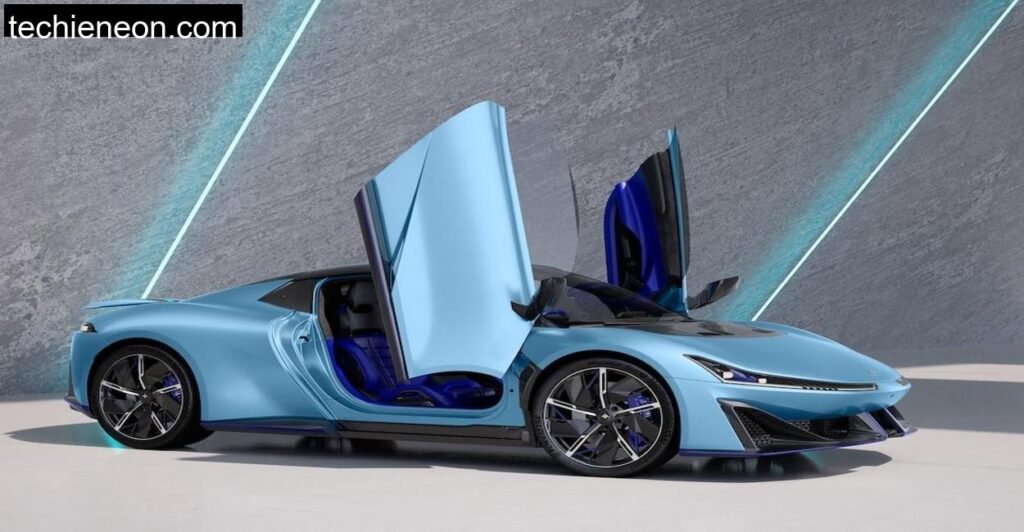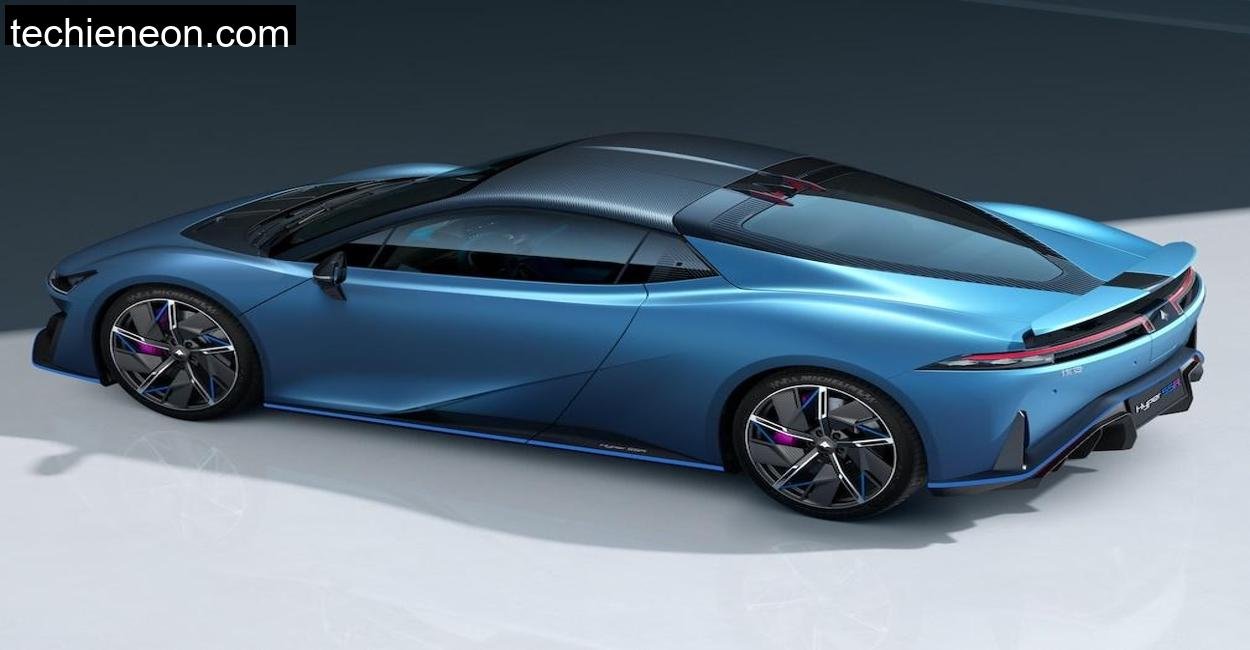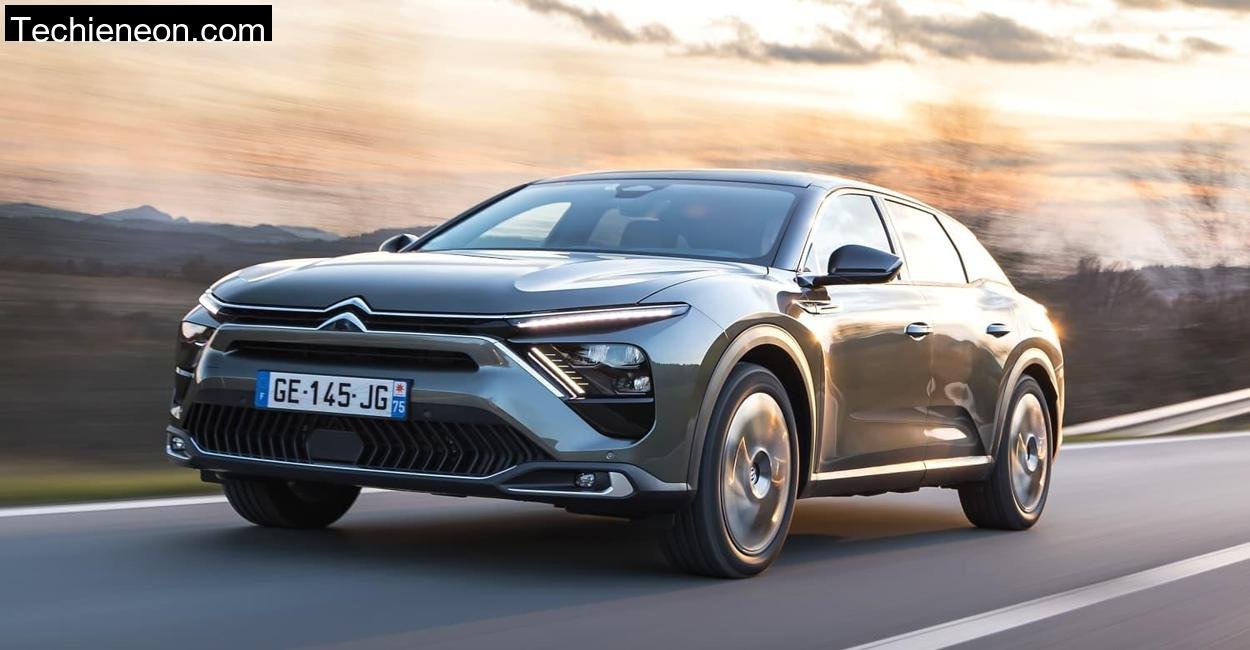The First Glimpse: Styling That Plays a Dangerous Game
There’s no gentle way to say this: the Hyptec SSR looks like it was designed by an algorithm told to remix every exotic supercar you’ve ever drooled over. From certain angles, it evokes Ferrari 458 vibes. The side profile nudges you toward a McLaren 720S. The front? Somewhere between NSX and Corvette C8. It’s wide, low, orange (at least my test unit was), and unapologetically loud.
But there’s an honesty in that chaos.
When those dramatic scissor doors hissed open at the push of a button, revealing a surprisingly angular cockpit, it stopped being funny. It was serious. Sharp carbon fiber lines met aluminum surfaces with purposeful placement. The roofline sat almost claustrophobically low. Every inch screamed, “I go fast.”
Now those are numbers. But as every driver knows, specs are only part of the story. The truth lies in what those numbers feel like when your foot hits the floor. And Beckum Hill was about to help me find out.
Beckum Hill and the First Launch: Instant Violence
Beckum Hill has a personality. It starts with a deceptive gentleness, sweeping curves, short flats, and then slaps you with elevation, blind crests, and a snaking descent that’ll expose any car’s weaknesses in handling, braking, or balance.
I slid into the Hyptec SSR’s racing seat. The seating position was oddly high for a supercar, thanks to the battery pack under the floor, but snug. The square-shaped Formula 1-style steering wheel reminded me this wasn’t built for comfort. It was built for battle. I toggled the roof-mounted start switch (yes, like a fighter jet), the display lit up, and with barely a hum, the SSR was ready.
I floored it.
The acceleration was surgical. No drama, no screech, just pure, cold torque that hit my stomach like a gut punch. In less than two seconds, I was at triple digits, my brain desperately trying to catch up. I’ve driven ICE monsters that roar and rage, but the SSR? It doesn’t announce speed. It delivers it, with terrifying precision.
Braking, Balance, and Bravery in Corners

What surprised me was how well it managed the corners. You expect EVs to understeer, especially those with heavy battery packs. But the SSR’s weight distribution, helped by its tri-motor torque vectoring, makes it feel planted.
Midway through a tight uphill chicane, I felt it, traction that felt intelligent, not just grippy. Rear motors worked like surgical tools, allocating power where needed. On the downhill, regen braking combined with carbon brakes felt firm, if slightly artificial. But the bite was real.
It took only a lap and a half before I trusted it. Trusted it enough to push hard into a blind crest at 180 km/h, with confidence that this Chinese newcomer wouldn’t flinch.
Interior Tech: Sci-Fi Simplicity
Off the track, I explored the interior tech. It’s sleek, minimal, and oddly airplane-like. Most of the car’s controls are in the roof, an unconventional but interesting choice. Honking, turn signals, and drive modes are all touch-sensitive pads on the steering wheel. There’s no traditional center console clutter.
A massive vertical touchscreen dominates the center, handling everything from driving modes to live telemetry. And in front of the driver is a floating display screen, no need for a head-up display when the screen is already in your line of sight.
I liked the attention to future-focused ergonomics. What I didn’t like? Touch controls take some getting used to, especially when you’re barreling into a turn and trying to adjust regen levels. But again, this is not a commuter car. It’s a statement.
Real-World Range vs Claimed Numbers
Hyptec claims the SSR can do 506 km on a full charge. I did not drive it that far (thank Beckum Hill for that), but based on my test data, aggressive driving burned about 1% battery every 3 km. With highway cruising and gentle regen, I estimate a realistic 400 km range in mixed usage. Still impressive for a 1200+ hp monster.
Charging was not tested on-site, but the SSR supports 800V architecture and DC fast charging. That means, theoretically, 10-80% charge in under 20 minutes with the right hardware.
Noise, Vibration & Harshness (NVH): The Silent Storm
Here’s the twist: the SSR is near-silent. Beyond tire noise and occasional electric motor whine, there’s little auditory feedback. For some, that’s sterile. For me, it was… ghostly. Speed feels even faster when there’s no sound to warn you.
There’s no fake engine noise piped in, no soundtracks, no drama. Just speed.
Conclusion: China’s Supercar Punches Hard, And It’s Real
By the end of my runs at Beckum Hill, the Hyptec SSR had earned my respect. No, it doesn’t have the legacy of Ferrari or the emotional scream of a V12. It lacks pedigree. It lacks fame. But what it doesn’t lack is performance, poise, or presence.
It feels like a calculated, ambitious, brutally fast experiment from a nation that’s tired of being taken lightly in performance car circles. And if they keep refining it, dialing in better software, tighter controls, and a touch of soul, the SSR could be the face of a new era.
Not bad for a car you can buy in China for a tenth of the price of a Rimac Nevera.



Leave a Comment